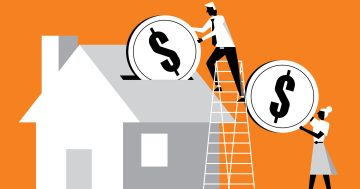With interest rates at record lows and with future uncertainty, this may seem a good time to borrow. Barbara Friedberg* lists some of the pros and cons that might arise.
 Unemployment is rising and interest rates are low, seems like a good time to borrow money to help get through a rough patch…maybe.
Unemployment is rising and interest rates are low, seems like a good time to borrow money to help get through a rough patch…maybe.
Smart borrowing can be part of a wise financial plan or a path to financial ruin.
Borrowing money to finance life expenses is a big decision and should be considered only after looking at other alternatives.
In most cases, borrowing money is a last resort. Typically, it’s preferable to avoid borrowing.
The exceptions include borrowing to buy a house, maybe borrowing to buy a car, and borrowing to help pay for education.
You might be surprised that the last two borrowing money cases can be avoided.
Before borrowing money consider ways to cut expenses and make more money.
If you are unemployed, or facing lower income, then cutting expenses is the first step.
Now is the time to eliminate unnecessary expenses like a newer car with a large payment, an expensive apartment and unnecessary subscriptions.
Next, seek out ways to make more income, now.
There are many paths to boosting your income for the short and long term, from simple steps like signing up for InBox Dollars to make money while on line, to selling your stuff online.
It’s best to borrow money for an appreciating asset or one that will grow in value. This includes a business loan or mortgage loan for rental real estate or a home.
That way, you’ll be making money with the borrowed funds.
Now might be the best time to refinance your mortgage or take a reverse mortgage loan if you’re older and strapped for money.
Just don’t extend the term of your loan, or you may end up paying more in total interest.
When considering interest rates over the long term, this is among the lowest interest rate in many decades.
With interest rates lower than they’ve been in decades it may be time to remodel your home, go back to university, or replace that 15-year-old car.
Whenever you take out a loan, it’s best to borrow for something that will be around awhile.
If you are in a dire financial situation, then you might need to borrow money just to get by until you receive income from a new job.
This should be a last resort, but sometimes there are no other alternatives.
Unsecured loans typically charge greater amounts of interest, and if your credit score isn’t great, then you’ll likely have to pay more interest.
So, shop around for a loan that charges the least amount of interest.
Finally some responsible borrowing tips.
Never borrow more than you can pay back.
If possible borrow only for items that will last a long time. Forget taking out a loan for a vacation, wedding, or gifts.
Evaluate the interest rate and the monthly payment before you borrow. Also, get an estimate of the total amount of money that you’ll borrow.
Try to avoid borrowing if you’re not certain how you will pay back the loan.
Do not borrow on impulse, and spend some time considering the purpose of the loan
*Barbara Friedberg heads Barbara Friedberg Personal Finance.
This article first appeared at barbarafriedbergpersonalfinance.com.











